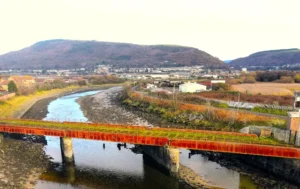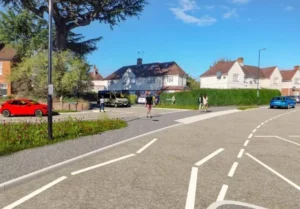Up to £4bn of new public sector civil engineering projects for local communities across the UK are set to be accelerated as part of a new set of frameworks being launched by SCAPE.
SCAPE will begin the search for major contractors to support its third generation of the SCAPE Civil Engineering frameworks, with the new format placing net-zero carbon construction and work for local SMEs at the heart of delivery.
The re-procurement includes a £3.25bn framework for England, Wales and Northern Ireland (EWNI) and a separate £750m framework for Scotland, managed and operated by SCAPE Scotland.
Running for a period of four years from 2023, with an option to be extended for a further two years until 2029, the fully-managed frameworks will more than double the capacity of infrastructure focused activity procured through SCAPE. This follows the success of its existing frameworks which have commissioned more than 250 projects to date for public sector clients across the UK. The current frameworks are due to expire in January 2023.
SCAPE’s new frameworks will enable local authorities and public sector organisations to accelerate the delivery of major infrastructure projects – including highways, rail, flood and coastal, broadband and electric vehicle infrastructure – with no defined upper limit for project value. In the face of the climate emergency, the frameworks will also allow organisations access to net-zero ready specialist contractors to help them achieve their aims around climate change.
SCAPE says local businesses will sit at the heart of the new frameworks, with the successful principal contractor expected to engage with an extensive supply chain of SMEs. This allows better access for small businesses to major public sector contracts they might otherwise not have been able to bid for, while also allowing clients to procure locally-sourced specialist services.
They will also benefit from being able to agree termed service options following any major works, allowing contractors to form long term relationships with clients and local supply chains. Contractors will also be able to agree cost reimbursable contracts through the addition of NEC Option E.
Part of SCAPE’s suite of direct award frameworks, the new civil engineering frameworks have been developed following engagement with local authorities and other public sector bodies across the country, as well as industry body the Civil Engineering Contractors Association (CECA).
John Simons, group procurement director at SCAPE said: “The expansion of our civil engineering frameworks comes at a time when regeneration and investment in local infrastructure are playing a vital role in creating stronger local economies in a post-pandemic world.
“As a leading voice for the public sector, we’ve evolved our frameworks to provide our public sector colleagues with a platform to address the UK’s infrastructure needs in the coming years, with a greater focus than ever on facilitating the journey towards a net-zero future.
“We’ve received positive feedback from clients using the existing frameworks and by building on its success, we can help local authorities to achieve their objectives while providing a best-in-class direct award route to market that is underpinned by the fully managed approach we’ve developed over the past 15 years.”
Mark Robinson, group chief executive at SCAPE added: “Construction activity has been the bedrock of the country’s economic recovery and our civil engineering frameworks will further help contractors to deliver projects that will continue to ignite local economies and drive better outcomes for communities across the UK.”
SCAPE and SCAPE Scotland will be holding virtual market awareness sessions for prospective bidders as per below. To register your attendance, please click on the relevant link below.
A Contract Notice for each framework will be published in February 2022, where bidders will be invited to tender for either one or both frameworks. Preferred bidders will be announced in November 2022 before the current SCAPE Civil Engineering framework moves to expiry in January 2023.
























